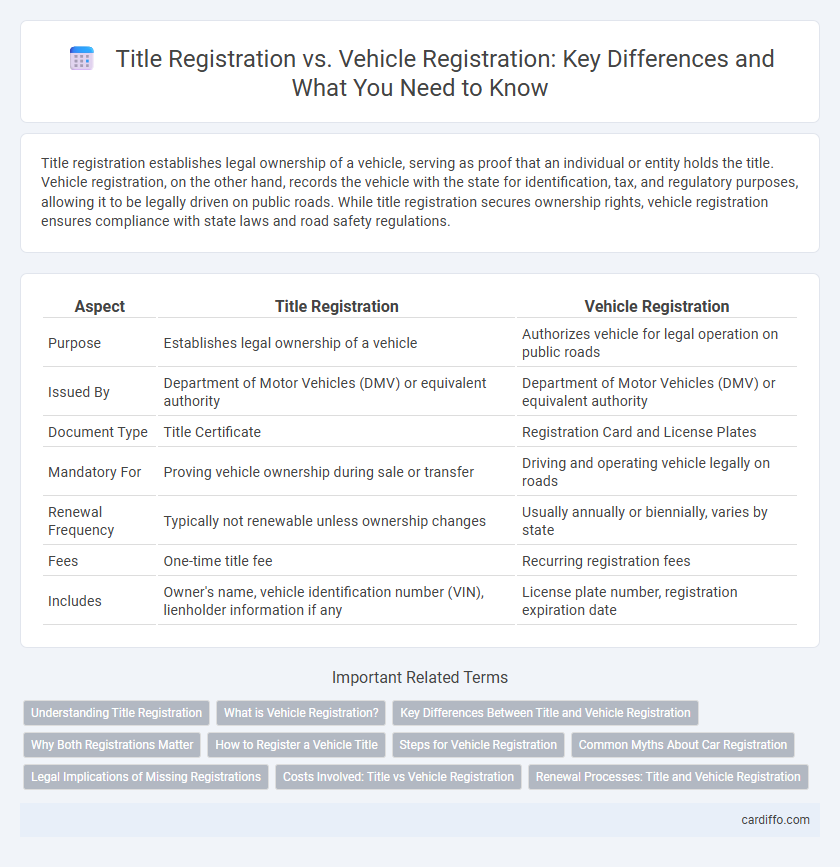Title registration establishes legal ownership of a vehicle, serving as proof that an individual or entity holds the title. Vehicle registration, on the other hand, records the vehicle with the state for identification, tax, and regulatory purposes, allowing it to be legally driven on public roads. While title registration secures ownership rights, vehicle registration ensures compliance with state laws and road safety regulations.
Table of Comparison
| Aspect | Title Registration | Vehicle Registration |
|---|---|---|
| Purpose | Establishes legal ownership of a vehicle | Authorizes vehicle for legal operation on public roads |
| Issued By | Department of Motor Vehicles (DMV) or equivalent authority | Department of Motor Vehicles (DMV) or equivalent authority |
| Document Type | Title Certificate | Registration Card and License Plates |
| Mandatory For | Proving vehicle ownership during sale or transfer | Driving and operating vehicle legally on roads |
| Renewal Frequency | Typically not renewable unless ownership changes | Usually annually or biennially, varies by state |
| Fees | One-time title fee | Recurring registration fees |
| Includes | Owner's name, vehicle identification number (VIN), lienholder information if any | License plate number, registration expiration date |
Understanding Title Registration
Title registration establishes legal ownership of a vehicle by recording the owner's name, vehicle identification number (VIN), and lienholder information on an official document issued by the state. It serves as proof of ownership and is crucial for transferring ownership during sale or inheritance. Unlike vehicle registration, which permits a vehicle to be operated legally on public roads by issuing license plates and registration stickers, title registration focuses solely on ownership rights and history.
What is Vehicle Registration?
Vehicle registration is the official process of recording a vehicle with government authorities, linking it to the owner for legal identification and regulation purposes. This process issues a registration certificate and license plates that must be displayed on the vehicle to verify its compliance with local laws and regulations. Unlike title registration, which establishes ownership, vehicle registration primarily ensures the vehicle is recognized, insured, and roadworthy.
Key Differences Between Title and Vehicle Registration
Title registration establishes legal ownership of a vehicle, serving as proof of who holds the title, while vehicle registration links the vehicle to a specific owner for legal operation on public roads. Title registration includes details such as the owner's name, vehicle identification number (VIN), and any lienholders, whereas vehicle registration involves issuing license plates and registration stickers that must be renewed periodically. Understanding the distinction ensures compliance with state laws and facilitates processes like selling the vehicle or renewing registration.
Why Both Registrations Matter
Title registration confirms legal ownership of a vehicle, establishing the owner's rights and protecting against theft or fraud. Vehicle registration links the car to the owner's identity and ensures compliance with state laws, including payment of taxes and fees. Both registrations are essential for verifying ownership, enabling legal operation of the vehicle, and facilitating accurate record-keeping by authorities.
How to Register a Vehicle Title
Registering a vehicle title involves submitting the original title document to the local Department of Motor Vehicles (DMV) or equivalent authority, along with proof of ownership, identification, and payment of required fees. Unlike vehicle registration, which assigns a license plate and allows the vehicle to be legally driven, title registration establishes legal ownership of the vehicle. Completing the title registration process is essential before obtaining vehicle registration, ensuring clear ownership rights are recorded in public records.
Steps for Vehicle Registration
Vehicle registration involves submitting an application to the local Department of Motor Vehicles (DMV), providing proof of ownership such as the vehicle title, and paying applicable registration fees. Required documents typically include identification, proof of insurance, and a completed registration form, which may be available online or in person. Once approved, the vehicle owner receives license plates and a registration sticker, enabling legal operation on public roads.
Common Myths About Car Registration
Many people confuse title registration with vehicle registration, but they serve distinct purposes; title registration proves legal ownership, while vehicle registration grants permission to drive the car on public roads. A common myth is that registering a vehicle transfers ownership, but only the title does. Another misconception is that you can drive without registration if you own the title, yet state laws require valid vehicle registration for all operational vehicles.
Legal Implications of Missing Registrations
Title registration legally proves vehicle ownership, essential for transferring ownership or securing loans, while vehicle registration authorizes the vehicle's use on public roads and is mandatory for compliance with traffic laws. Failure to register the title can result in disputes over ownership, financial liability issues, and legal complications during resale or insurance claims. Missing vehicle registration leads to fines, impoundment, and inability to legally operate the vehicle, exposing the owner to enforcement actions and increased legal risks.
Costs Involved: Title vs Vehicle Registration
Title registration typically involves a one-time fee ranging from $15 to $60, depending on the state, covering the legal ownership documentation of the vehicle. Vehicle registration costs are generally annual or biennial fees averaging between $30 and $200, which fund road maintenance and vehicle regulation enforcement. Additional costs for vehicle registration can include taxes, inspection fees, and renewal penalties, making it usually more expensive than title registration over time.
Renewal Processes: Title and Vehicle Registration
Title registration renewal typically involves verifying ownership and ensuring no liens exist, often requiring submission of updated documents and payment of fees to maintain legal proof of ownership. Vehicle registration renewal focuses on updating the registration status annually, including emission tests, insurance validation, and payment of registration fees to ensure the vehicle remains legally operable on public roads. Both renewal processes are essential for compliance but serve distinct legal and operational functions in vehicle ownership and usage.
Title Registration vs Vehicle Registration Infographic

 cardiffo.com
cardiffo.com